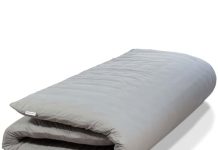Have you ever wondered about the lifespan of a floor mattress? In this article, we will explore the typical duration that you can expect from a floor mattress before it starts to show signs of wear and tear. From the quality of materials to proper maintenance, we will cover all the factors that can affect the longevity of your beloved floor mattress. So, if you’re curious to know how long you can cozy up on your floor mattress, keep on reading!
Review contents
Factors Affecting Floor Mattress Lifespan
When it comes to the lifespan of a floor mattress, there are several key factors that can greatly influence its durability and longevity. Understanding these factors can help you make informed decisions when purchasing and caring for your floor mattress.
Quality of Materials
The quality of materials used in the construction of a floor mattress plays a significant role in its overall lifespan. High-quality materials, such as dense foams and durable fabrics, are more likely to withstand the wear and tear of daily use. On the other hand, mattresses made with lower-quality materials may deteriorate much quicker, resulting in a shorter lifespan.
Frequency of Use
How often you use your floor mattress can also impact its lifespan. If you use it as a primary sleeping surface and sleep on it every night, it will undoubtedly experience more wear and tear compared to a mattress that is used occasionally or for temporary accommodation. The more frequently your floor mattress is used, the quicker it is likely to wear out.
Weight Capacity
The weight capacity of a floor mattress is another crucial factor to consider. Each floor mattress has its own weight limit, and exceeding this limit can lead to premature sagging, decreased support, and ultimately a shorter lifespan. It is important to choose a mattress that can comfortably accommodate the weight of all users to ensure its longevity.
Maintenance
Proper maintenance is essential for extending the lifespan of a floor mattress. Regular cleaning, spot treatment, and airing out can help prevent the buildup of dirt, dust, sweat, and allergens that can degrade the mattress over time. Following the manufacturer’s care instructions and using appropriate cleaning products can help maintain the integrity of the materials and prolong the lifespan of your floor mattress.
Environmental Factors
The environment in which your floor mattress is used can also influence its lifespan. Excessive exposure to sunlight, high humidity, or extreme temperature fluctuations can cause the materials to deteriorate more rapidly. It is best to place your floor mattress in a cool, dry, and well-ventilated area to minimize these environmental factors and ensure its longevity.
Average Lifespan of Different Floor Mattress Types
Different types of floor mattresses have varying lifespans based on their construction and materials. Here, we will discuss the average lifespan of some popular floor mattress types.
Foam Mattress
Foam mattresses are renowned for their comfort and support. On average, a high-quality foam mattress used as a floor mattress can last between 7 to 10 years. However, the lifespan may vary based on factors like foam density, the presence of additional support layers, and the frequency of use.
Inflatable Mattress
Inflatable mattresses offer convenience and easy storage, making them a popular choice for camping or guest accommodation. The average lifespan of an inflatable mattress used as a floor mattress typically ranges from 3 to 7 years. However, this lifespan can be affected by the quality of the materials, the frequency of inflation and deflation, and the weight capacity of the mattress.
Futon Mattress
Futon mattresses, which are composed of a thick layer of cotton batting and sometimes foam, are known for their versatility. With proper care, a high-quality futon mattress used as a floor mattress can last between 5 to 8 years. However, factors such as the weight capacity, the thickness of the mattress, and the frequency of use can impact its lifespan.
Roll-Up Mattress
Roll-up mattresses, also known as folding or tri-fold mattresses, are designed for easy storage and portability. These mattresses typically consist of foam layers or foam combined with other materials. The average lifespan of a roll-up mattress used as a floor mattress tends to be around 5 to 7 years. However, factors such as foam density, the number of folds, and the weight capacity may affect its longevity.
Signs That Your Floor Mattress Needs to be Replaced
Even with proper care and maintenance, there will come a time when your floor mattress needs to be replaced. Here are some common signs that indicate it’s time to invest in a new one.
Loss of Comfort and Support
One of the most noticeable signs that your floor mattress needs to be replaced is a significant loss of comfort and support. If you find yourself waking up with aches and pains or experiencing discomfort during sleep, it may be a sign that the mattress is no longer providing adequate support. Over time, the materials in the mattress can lose their resilience, resulting in decreased comfort and support.
Visible Wear and Tear
Visible wear and tear on the surface of the mattress, such as sagging, lumps, or indentations, are clear indicators that it’s time for a replacement. These signs suggest that the mattress has reached the end of its lifespan and can no longer provide the level of comfort and support that it once did.
Development of Odor
If your floor mattress starts emitting an unpleasant or musty odor that cannot be eliminated with proper cleaning, it may be a sign that the materials within the mattress have started to deteriorate. This could be due to the accumulation of sweat, dust, or allergens over time, leading to an unhealthy sleeping environment. It’s important not to ignore such odors as they can potentially affect your health and quality of sleep.
Allergies or Health Issues
If you notice an increase in allergies or experience health issues such as respiratory problems, it could be a result of allergens or dust mites present in your floor mattress. Over time, these allergens can build up and become difficult to eliminate completely. If your mattress cannot be thoroughly cleaned or if you continue to experience health issues despite proper maintenance, it may be time to replace it.
Sagging or Unevenness
A sagging or uneven surface is another sign that your floor mattress may need to be replaced. Over time, the materials can deteriorate and lose their ability to provide even support. This can lead to discomfort and strain on certain areas of the body, potentially causing pain or disrupting sleep. If you find yourself constantly readjusting your position to find a comfortable spot, it’s a clear sign that your mattress has lost its structural integrity.
How to Extend the Lifespan of Your Floor Mattress
While the lifespan of a floor mattress can be influenced by various factors, there are several measures you can take to maximize its durability and longevity.
Use a Mattress Protector
Using a mattress protector can help shield your floor mattress from spills, stains, dust, and allergens. This protective layer acts as a barrier, preventing these elements from seeping into the mattress and causing damage over time. Additionally, a mattress protector can be easily removed and cleaned, further enhancing the cleanliness and hygiene of your mattress.
Proper Cleaning and Maintenance
Regular cleaning and maintenance are crucial for extending the lifespan of your floor mattress. Follow the manufacturer’s guidelines for cleaning, which usually involve spot cleaning and airing out the mattress regularly. It is important to avoid soaking the mattress with excessive moisture, as this can lead to mold or mildew growth. Regular cleaning and maintenance help remove dirt, sweat, and allergens, preserving the freshness and longevity of the mattress.
Rotate and Flip the Mattress
Rotation and flipping of the mattress can help distribute the weight more evenly and prevent excessive wear on certain areas. This is especially important for foam or futon mattresses, as they may develop indentations or sagging over time. Consult the manufacturer’s guidelines to determine the appropriate rotation schedule for your specific floor mattress.
Avoid Excessive Weight and Rough Handling
To prolong the lifespan of your floor mattress, avoid placing excessive weight on it or subjecting it to rough handling. Excessive weight can cause the materials to compress and lose their shape, while rough handling can lead to tears or damage. Be mindful when moving or relocating the mattress, taking care to avoid dragging or bending it excessively.
Regular Inspection and Repairs
Performing regular inspections of your floor mattress allows you to identify any potential issues or signs of wear and tear. Check for loose seams, fabric tears, or any other damage that may compromise the integrity of the mattress. Promptly address any repairs or replacements needed to maintain the longevity of your floor mattress.
Summary
In conclusion, the lifespan of a floor mattress can be influenced by various factors such as the quality of materials, frequency of use, weight capacity, maintenance, and environmental factors. Foam, inflatable, futon, and roll-up mattresses each have different average lifespans based on their construction and materials. Signs that indicate the need for a replacement include loss of comfort and support, visible wear and tear, development of odor, allergies or health issues, and sagging or unevenness. To extend the lifespan of your floor mattress, utilize a mattress protector, practice proper cleaning and maintenance, rotate and flip the mattress, avoid excessive weight and rough handling, and conduct regular inspections and repairs. By taking these measures, you can enjoy a comfortable and durable floor mattress for years to come.



























